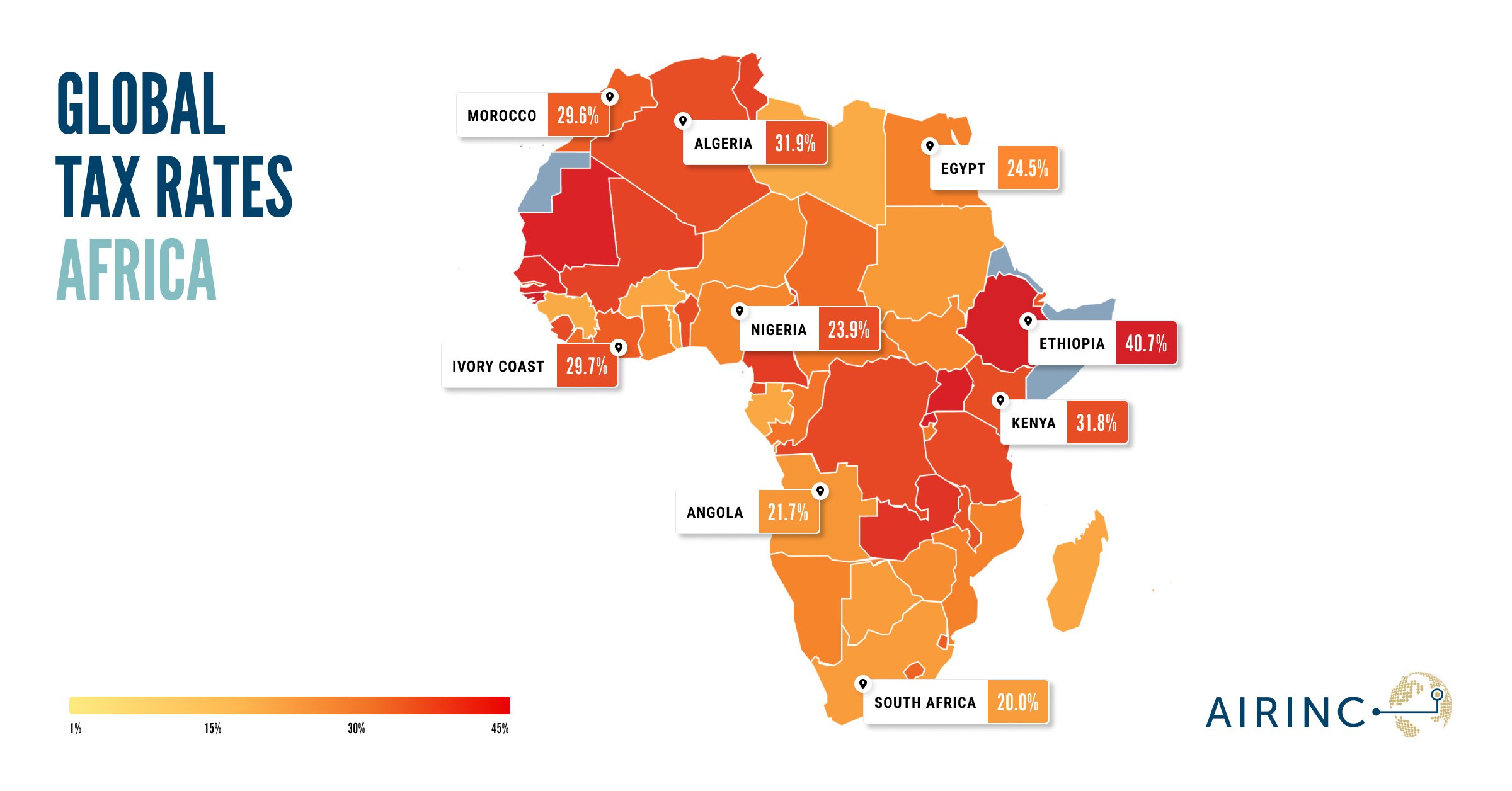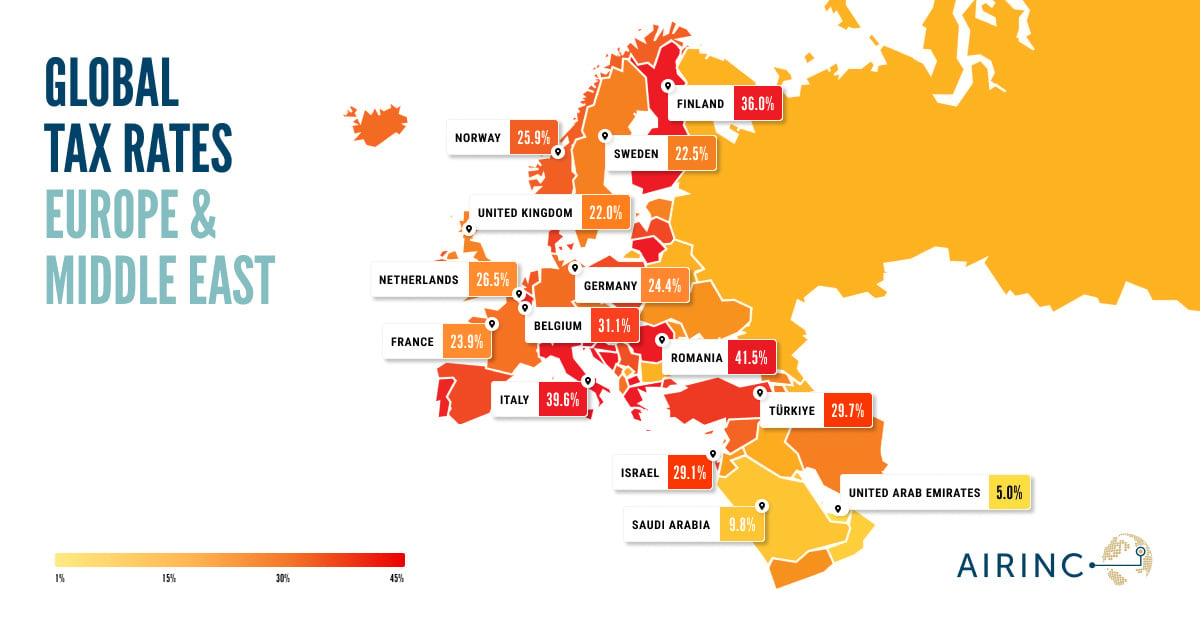Building on our exploration of Europe and the Middle East in our previous blog, we now turn to Africa, a region where tax systems are as diverse as its economies. As part of AIRINC’s Global Tax Rates Maps, this blog highlights how Africa’s tax policies shape income and mobility strategies. From nations with rapidly modernizing tax systems to those grappling with challenges of informal economies, Africa offers a unique perspective on global taxation.
What Is the Africa Tax Rates Map?
The Africa Heat Map provides a comprehensive overview of the diverse tax environments across the continent, highlighting the challenges and opportunities that global mobility programs may encounter when managing assignments in Africa. Click here and zoom in for rates per country.
Individual Income Taxes in Africa: A Closer Look at Key Countries
Africa's diverse landscape spans a range of income tax systems, each shaped by economic priorities, government policies, and regional considerations. Understanding the intricacies of these tax systems is crucial for anyone navigating the continent's rapidly developing economies. In this analysis, we take a closer look at the individual income tax frameworks in nine key African nations: Angola, Algeria, Egypt, Ethiopia, Ivory Coast, Kenya, Morocco, Nigeria, and South Africa.
Angola: Tax Reforms and a Heavy Reliance on Oil Revenue
Angola has a relatively low individual income tax rate structure, ranging from 0% to 25%. However, the country faces challenges related to oil dependency and economic diversification, which have had an impact on the effectiveness of its tax collection system. Despite efforts to diversify its economy, Angola's reliance on oil for state revenue has created inconsistencies in tax policy, with a lack of public trust in the system further complicating tax collection. Angola’s tax system is still developing, and significant reforms are necessary to build a more reliable and sustainable income tax framework.
Algeria: High Rates, Complexities, and Evasion Challenges
Algeria presents an individual income tax framework that ranges from 0% to 35%, but tax evasion remains a key challenge. While its tax rates are lower than those of some other African nations, the enforcement and clarity of tax laws continue to hinder comprehensive collection. Despite the government’s ongoing efforts to streamline tax processes, the complexity of the system and the widespread tax evasion, due in part to a large informal economy, make it difficult to fully optimize the country’s tax revenues.
Egypt: Progressive Rates and Ongoing Reforms
Egypt's individual income tax system is structured to be progressive, with rates that range from 0% to 27.5%. Recent tax reforms have been implemented to address issues of non-compliance and to broaden the tax base in a rapidly growing economy. The Egyptian government has been gradually implementing reforms aimed at improving tax collection and expanding compliance. These efforts include streamlining processes and formalizing the informal sector. While Egypt is making strides, the system still faces challenges as it continues to evolve.
Ethiopia: Emerging Reforms in a Developing Economy
Ethiopia’s tax system, with rates ranging from 0% to 35%, reflects the country’s commitment to expanding its tax base and fostering economic stability. With ongoing reforms aimed at improving compliance, the system is still in the process of modernization. The Ethiopian government has made significant strides to expand the formal tax base through modernization efforts and new policies designed to simplify the tax process. As Ethiopia seeks to diversify its economy, the ongoing tax reforms are expected to play a crucial role in shaping the future of the country’s fiscal system.
Ivory Coast (Côte d'Ivoire): A Growing Tax Base Amid Challenges
Ivory Coast’s individual income tax system is progressive, with rates ranging from 0% to 47.5%. Although the country’s tax collection efforts are improving, high rates on upper-income earners can be a deterrent. The government’s drive to attract foreign investment and stimulate economic growth includes incentives for businesses, but these high income taxes can be off-putting for wealthy individuals and expatriates. As Ivory Coast continues to modernize its economy, its tax policies may need to evolve to better balance encouraging investment while maintaining tax revenue.
Kenya: Progressive and Evolving Tax Framework
Kenya employs a progressive tax system, with rates ranging from 10% to 35%. The country has been actively reforming its tax policies to increase revenue and streamline compliance in both the formal and informal sectors. Kenya has made strides toward digital tax collection systems and increasing VAT, which have led to improvements in compliance and revenue generation. As Kenya continues to grow, its evolving tax system reflects a push towards greater efficiency, though challenges with evasion persist in the informal economy.
Morocco: A Progressive System with Incentives for Growth
Morocco has developed a progressive individual income tax system designed to reflect the country's growing economic potential. Individuals are taxed on a progressive scale, with rates ranging from 0% to 38%, based on income levels. Morocco offers various tax exemptions, particularly for income derived from agriculture, to foster growth in vital sectors. Additionally, several double-taxation treaties encourage foreign investment, particularly in industries such as finance and manufacturing. While Morocco's tax system is relatively straightforward, it does place significant taxes on higher earners, which could discourage ultra-high-net-worth individuals from settling there.
Nigeria: Navigating Complexity in a Resource-Rich Economy
Nigeria’s individual income tax rates are progressive, ranging from 7% to 24%. While the country’s tax rates are moderate, Nigeria faces significant challenges due to its dependence on oil exports, widespread tax evasion, and a large informal sector. Despite moderate rates, tax evasion and a reliance on oil revenue have left Nigeria struggling to maximize its income tax potential. Efforts to formalize the informal sector and increase tax compliance have met with mixed success. For individuals looking to work in Nigeria, it’s important to be aware of the gaps in the country’s tax system and the potential challenges in maintaining full compliance.
South Africa: A Well-Developed Tax System with High Rates
South Africa boasts one of the most developed and transparent tax systems in Africa. With tax rates ranging from 18% to 45%, the country’s tax system is designed to ensure significant contributions from higher earners. The country has a highly developed tax collection infrastructure, including efficient systems for tracking income and ensuring compliance. Although South Africa's high rates may be burdensome for higher earners, its well-structured tax system ensures that tax revenue is a cornerstone of the country’s fiscal policy.
Trends Revealed by the Rates Maps
- High Tax Burdens in Formal Economies: Countries like South Africa and Kenya impose relatively high income taxes, especially for middle-income earners, to fund public services and infrastructure development.
- Low Tax Compliance in Informal Economies: In nations where informal economies dominate, such as Nigeria and Ghana, tax revenue is often limited, placing a disproportionate burden on formal sector workers.
- Tax Incentives for Investment: Countries like Rwanda and Mauritius use favorable tax policies to attract foreign investors and incentivize economic growth.
AIRINC: Supporting Mobility in Africa
With its diverse tax landscape, Africa presents both challenges and opportunities for global mobility programs. AIRINC’s robust tax database and expert insights empower organizations to navigate these complexities confidently, ensuring compliance and cost-effective mobility solutions.
Key Takeaways
Africa's individual income tax systems present a varied and complex landscape, influenced by economic priorities, administrative challenges, and the degree of formalization in each country. While nations like South Africa and Morocco offer well-developed systems with high transparency, others, such as Nigeria and Angola, face hurdles such as tax evasion, heavy reliance on oil revenues, and large informal sectors. In countries like Ethiopia and Kenya, ongoing tax reforms show promise for improved compliance and revenue generation, although challenges remain.
For businesses and individuals operating in Africa, staying informed about local tax policies, rates, and incentives is crucial for navigating the continent’s rapidly evolving economic environments. As African nations continue to modernize their tax systems, understanding the nuances of each country's framework will be key to optimizing financial strategies and ensuring tax compliance.
Look Out for the Next Blog!
Stay tuned as we explore the APAC region, where developed economies and emerging markets collide to create a fascinating tax landscape.
Are you looking for information on global tax rates around the world?AIRINC’s International Tax Guide contains all of the information you need to support your assignment tax planning — including global tax rates, deductions, and employee/employer social security contributions. |
Are you trying to move an employee from a lower- to a higher-tax rate location?Use AIRINC’s Global Salary Comparison to understand the compensation you would need to offer to cover the difference and make the appropriate offer to your employee. |
Want to hear even more on tax?!Listen again to our recent Global Tax Chat show. The session covered the latest updates in global tax compliance, including significant regulatory changes and how they impacted expatriate tax programs. |




%20(31).png)


